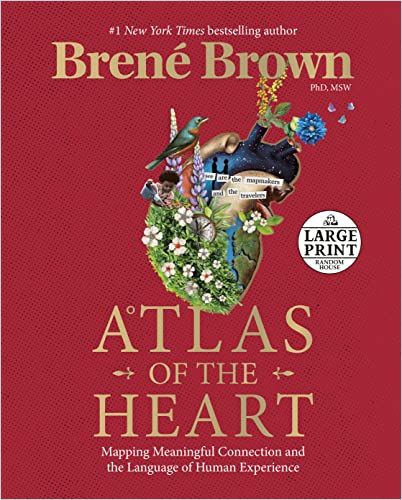Most people attempt to navigate the complexity of their emotional life with only a handful of words. This limited emotional literacy impedes understanding, resulting in confusion, mistakes, and disconnection. Renowned clinical social worker, research professor, and speaker Brené Brown maps 87 emotions with clarity, compassion, and humor, offering a powerful guide to emotional understanding, self-awareness, and genuine connection.

Emotional Cartography
Clinical social worker, research professor and speaker Brené Brown has gained renown for helping leaders get comfortable with emotional vulnerability with her best-selling books The Gifts of Imperfection and Dare to Lead, and her wildly popular TEDx Talk, “The Power of Vulnerability.” Brown’s latest book arose out of research showing that, on average, people reach for only three words — “happy,” “sad,” and “angry” — when describing in-the-moment emotions.
In an interview on CBS, Brown asks, “What happens to us, and what happens to the connection that we have with ourselves and other people, when we have to shove really diverse experiences and emotions into just three big buckets?” The cost, she suggests, is that you lose the ability to understand and connect with yourself and other people, maintain emotional stability, and live a rich, balanced emotional life.
In Atlas of the Heart, Brown delves into 87 emotions and emotional states across the gamut of human experience, describing their associated feelings, their roles in human life, and their interconnections. In keeping with the cartographic reference in the book’s title, Brown categorizes these emotions according to the situations where they arise — chapter titles include, for example, “Places We Go When Things Are Uncertain or Too Much” and “Places We Go When Life Is Good.” Through personal anecdotes, hard research, and humor, Brown illuminates the nature and nuance of these “places we go.”
Find Power over Feelings by Naming Them
In part, Atlas of the Heart is an argument for the importance of emotional literacy. A lack of words to describe inner experiences, Brown says, hinders people from making sense of their inner turmoil, communicating their emotions to others, and sharing their experiences, rendering them unable to ask for and receive help. Not being able to find words to describe your emotional experiences severely impedes self-awareness, learning, and healing, and can lead to feelings of hopelessness and rage.
On the other hand, understanding your own, or other people’s, feelings empowers you to supply the need or move toward the change that the emotion indicates, Brown says. For example, anger often arises when you fail to gain an outcome you desire or as a response to an unmet expectation. When you can recognize your anger for what it is, you can look for the underlying emotions, such as disappointment, grief, pain, or betrayal, and take action to create change. Brown points out that being able to put words to your emotions also helps prevent mistaking one emotion for another, such as mistaking excitement for anxiety, or pity for sympathy.
Understanding emotion can be a life raft in a sea of turbulent feelings. (Brené Brown)
Brown advocates treating unpleasant emotions respectfully and probing them to discover their drivers. She says that all emotions — even the uncomfortable ones — offer information and signal opportunities. For example, loneliness serves as a warning of an unmet need for social connection; like hunger, it prompts you to supply what you’re missing. Confusion tells you that you’re encountering a puzzle or mystery and have an opportunity to explore a new area, and sadness follows a loss or defeat.
Brown notes that although sadness is a discomforting emotion, humans need to feel sad sometimes to develop compassion and empathy. She points out that most people enjoy having sadness evoked occasionally — that is why they watch sad movies. Being moved puts people in touch with their humanity and makes them feel connected to others.
For a Richer Life, Dig Deep
In a 2022 CBS interview, Brown quotes philosopher Ludwig Wittgenstein: “The limits of my language mean the limits of my world.” By putting words to emotions, Brown aims to expand and enrich readers’ emotional worlds, opening their eyes to the complexity of their own and others’ inner lives. For example, Brown points out that the overall feeling of joy encompasses many other feelings, such as a sense of freedom, expanded awareness, and deep connection to other people or something greater, such as God or nature.
Our connection with others can only be as deep as our connection with ourselves. (Brené Brown)
In a moving description of grief, Brown probes the many emotions a bereaved person will feel — primarily loss, longing, and feeling lost. After a death, separation, or betrayal, she says, the sense of loss might stem not only from the loss of the person but also from the loss of possibilities, loss of normality, or loss of a belief about a person; grieving includes longing for the restoration of what was lost. For Brown, the feeling of being lost arises from the disruption in the grieving person’s world, and grief is, in part, a process of trying to rebuild meaning.
To Build Belonging, Tame Shame
For leaders seeking to build psychological safety and trust within teams, Brown offers important observations about the feeling of belonging — and its concomitant, shame. Every human feels both a desire to belong and — whether it’s visible on the surface or submerged deep down — a feeling of being flawed, inadequate, and therefore unworthy to belong, Brown says. People’s desire for belonging is so great that it can lead them to betray themselves, sacrificing their authenticity or freedom to obtain it. However, this only succeeds in making them fit in, not truly belong.
True belonging doesn’t require us to change who we are; it requires us to be who we are. (Brené Brown)
For genuine belonging, Brown says, people must share their real selves, and this requires both vulnerability and self-acceptance. Brown urges leaders to enable people’s experience of belonging in the workplace, and to include a belonging component in diversity, equity, and inclusion efforts.
In the CBS interview, Brown told Norah O’Donnell, “This is not just a linguistics exercise — this is about the quality of our lives.” By helping readers find words for their feelings, she provides valuable guidance in navigating the choppy seas of the soul, and moving toward authenticity and connection in the outer world, too.














